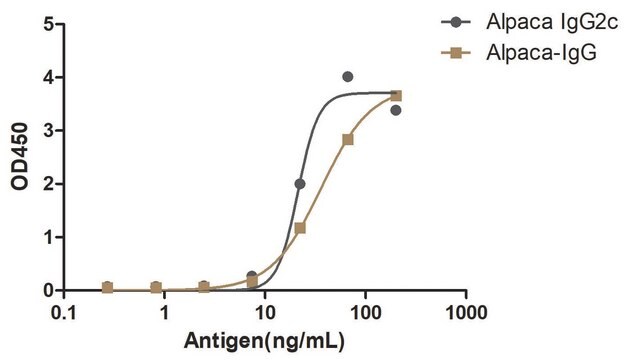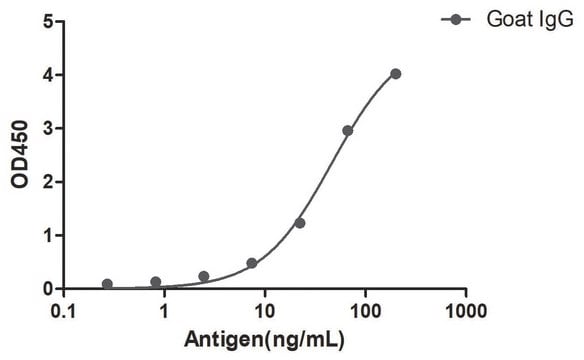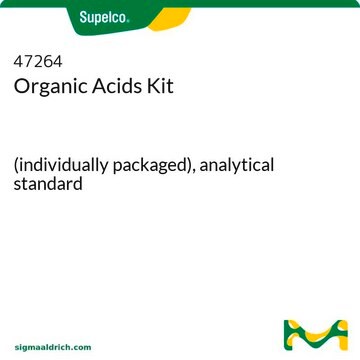SAB5801061
Rabbit Anti-Alpaca IgG2c Alpaca Heavy chain only Antibody
recombinant Alpaca(VHH) Nano antibody
Synonyme(s) :
Recombinant Alpaca single variable domain secondary Nanobody
About This Item
Produits recommandés
Source biologique
alpaca
Produit recombinant
expressed in HEK 293 cells (Human cell line)
Conjugué
unconjugated
Forme d'anticorps
affinity purified immunoglobulin
Type de produit anticorps
secondary antibodies
Clone
recombinant monoclonal
Forme
lyophilized solid
Poids mol.
100 kDa
Espèces réactives
Alpaca, (alpaca)
Technique(s)
ELISA: 1:4000-1:10000
western blot: 1:4000-1:10000
Taille
0.1 mL
Couleur
colorless
Isotype
VHH
Conditions d'expédition
wet ice
Température de stockage
2-8°C
Description générale
The biological family Camelidae comprises camels (one-humped Camelus dromedarius and two-humped Camelus bactrianus), llama (Lama glama and Lama guanicoe), and vicugna (Vicugna vicugna and Vicugna pacos). Camelidae contain two kinds of IgG in serum: conventional antibodies (IgG1) containing two light chains and two heavy chains (composed of the VH, CH1, hinge, and CH2 and CH3 domains) and two types of homodimeric heavy-chain antibodies (HCAbs), IgG2 and IgG3, which comprise only H chains: each H chain contains a VHH, hinge, and CH2 and CH3 domains. The smallest intact functional antigen-binding fragment of HCAbs is the single-domain VHH, also known as a nanobody(Nb). Alpaca is also called Vicugna pacos. Alpaca IgG contains IgG1a, IgG1b, IgG2b, IgG2c and IgG3.
Spécificité
Isotype: Rabbit IgG
Immunogène
Conditionnement
Forme physique
Reconstitution
Stockage et stabilité
Autres remarques
Vous ne trouvez pas le bon produit ?
Essayez notre Outil de sélection de produits.
Mention d'avertissement
Warning
Mentions de danger
Conseils de prudence
Classification des risques
Aquatic Chronic 3 - Skin Sens. 1
Code de la classe de stockage
13 - Non Combustible Solids
Classe de danger pour l'eau (WGK)
WGK 3
Point d'éclair (°F)
Not applicable
Point d'éclair (°C)
Not applicable
Certificats d'analyse (COA)
Recherchez un Certificats d'analyse (COA) en saisissant le numéro de lot du produit. Les numéros de lot figurent sur l'étiquette du produit après les mots "Lot" ou "Batch".
Déjà en possession de ce produit ?
Retrouvez la documentation relative aux produits que vous avez récemment achetés dans la Bibliothèque de documents.
Notre équipe de scientifiques dispose d'une expérience dans tous les secteurs de la recherche, notamment en sciences de la vie, science des matériaux, synthèse chimique, chromatographie, analyse et dans de nombreux autres domaines..
Contacter notre Service technique









